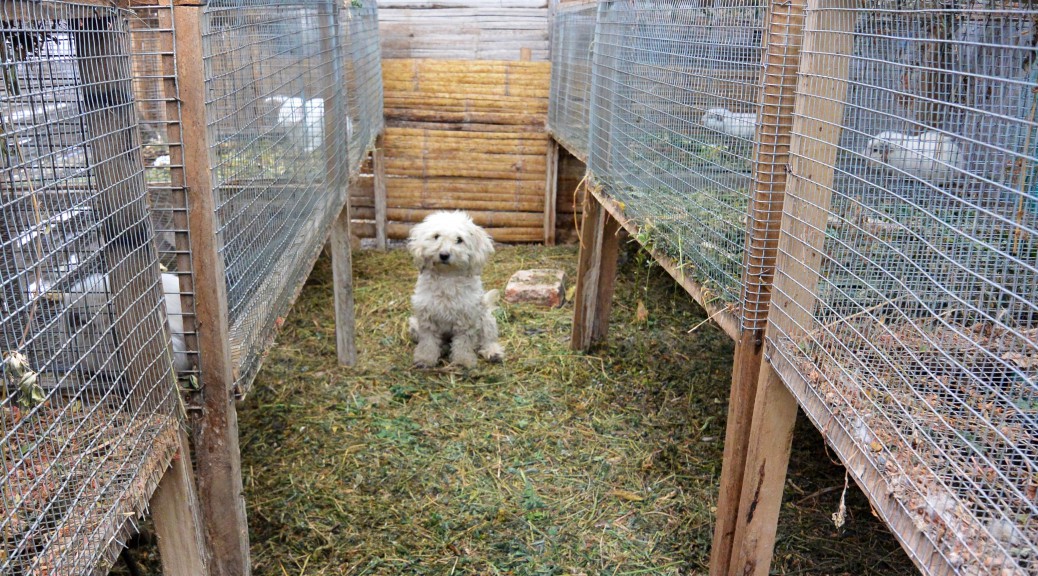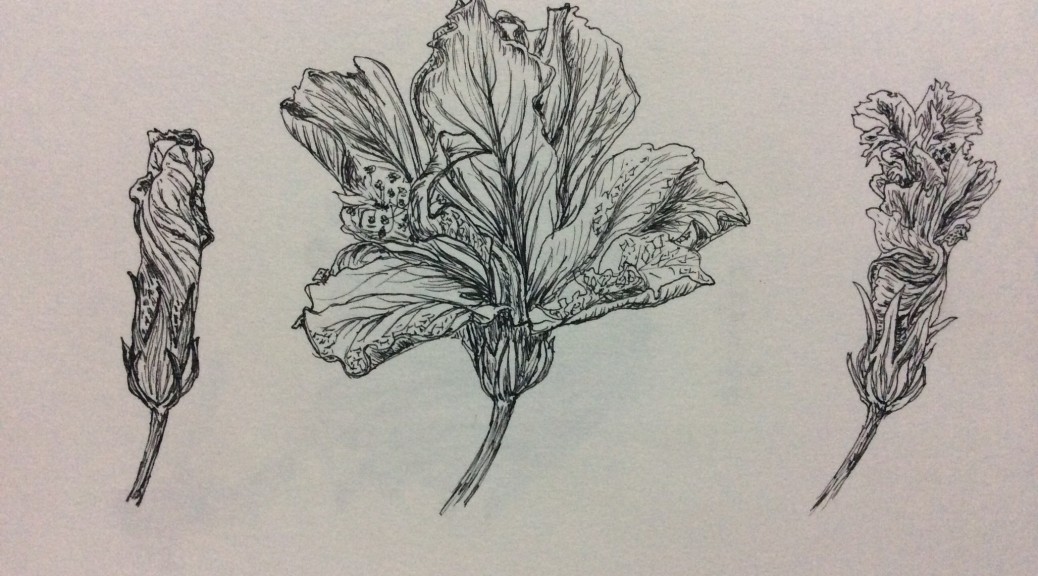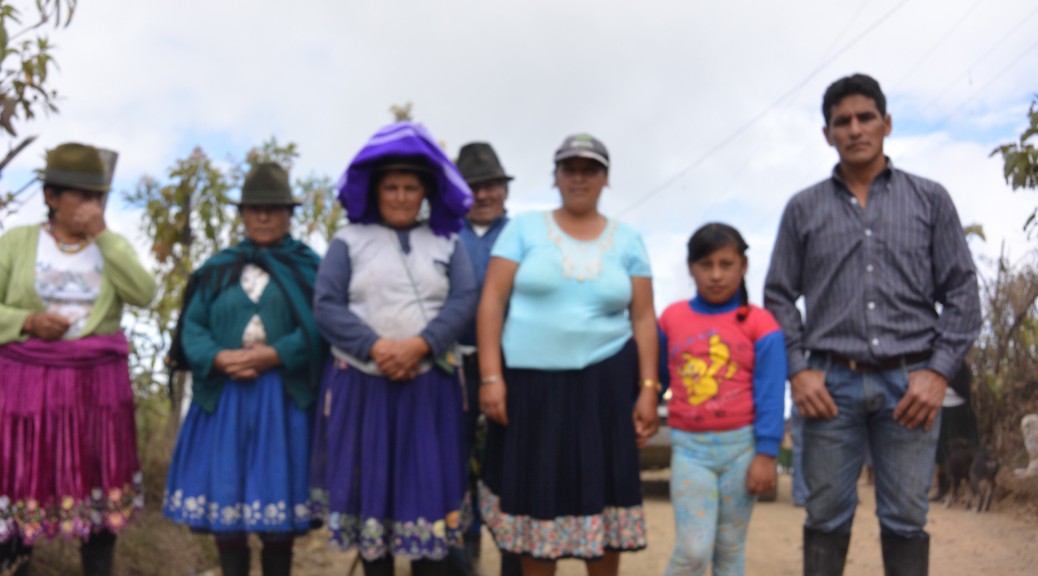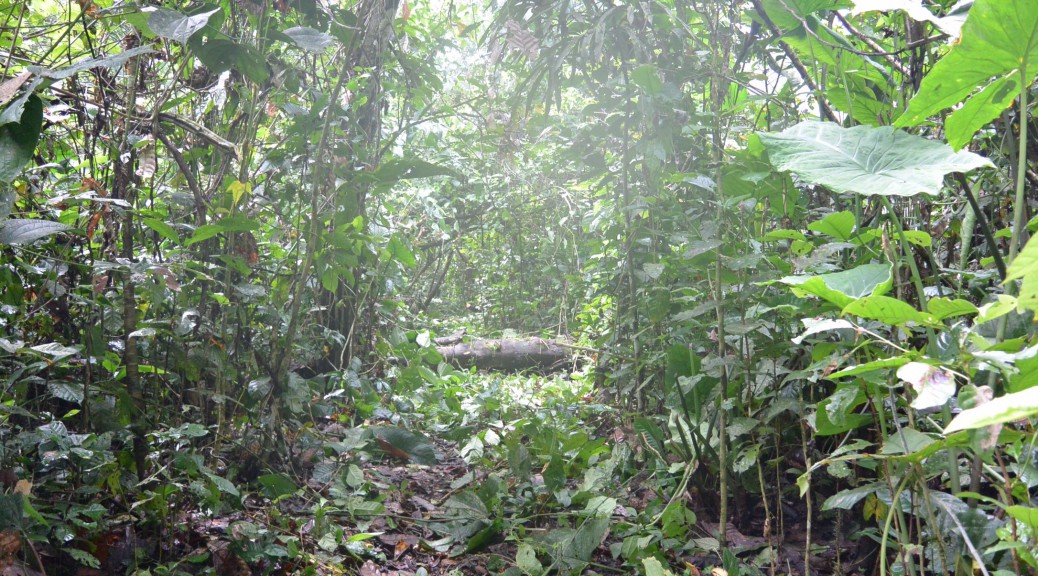“In the course of telling our tales, we can discover ourselves by becoming curious about the other struggling human beings with whom we live in the world.”
– Sheldon B. Kopp, If You Meet the Buddha on the Road, Kill Him!
With each passing second, the clouds are tinted a little more pink and the light flickering on the surface of the water becomes a little more speckled, the sun’s rays now being filtered through the trees at a thin angle. La loma se acuesta y empieza a soñar del día siguiente – the fields are submitting to sleep, dreaming up tomorrow’s day.
Mamita Flora and I are sprawled on the soft bed of grass lining the little stream that marks the edge of our jardín, the little piece of campo left to her upon her parents’ passing. My eyes cast upward, alighting on the eucalyptus leaves dancing in the breeze above.
“There are a lot of eucalyptus where I’m from, too,” I note aloud. Then remembering Mamita’s presence there with me, I add, “but we don’t build houses with them because they’re not strong like the ones here. My mom tells me it’s because they are different species – the ones in North America are too frail.”
“You and your mom are very close?” — it’s posed as a question, but it feels as if she already knows my answer. I turn and meet her eyes, my smiling ones welling warmly with tears.
“I miss her a lot,” I admit. “I’ve missed the feeling of belonging. I’ve been missing love.” Just two days before we found ourselves settled between blades of grass, the sun kissing our cheeks goodnight, I had met and moved in with Flora’s family: her and her three sons. “My past host family was lovely,” I tell my new Mamita Flora, “but we couldn’t find space within our lives and hearts to share with each other. And so I was left feeling quite alone… and my loneliness evolved into a lackluster, sad sort of living.”
I reflect in the silence that follows on how I’m feeling after only two days with my new family and how different it is from how I had felt within my previous family; although still finding my place within my new hogar and learning what it’s like to have three hermanitos, I had immediately connected with Flora’s vivacious, positive, and adventurous spirit and the values she shares with her sons.
“Díme, ¿qué tal fue? ¿Qué pasó?” Flora asks me gently. “Tell me, what was it like? What happened?”
And so I commence my tale, though too it is a tale of the world.
From September until January I lived with an indigenous family in the province of Cañar, named the cultural hub of Ecuador for the peoples’ continued practice and celebration of their pre-Incan Cañari culture and civilization. Living there, I not only experienced some of the cultural traditions that have been passed down for centuries, but also the more recent incursion of American culture and effects of globalization – sometimes within incredibly rural, previously untouched communities. In addition to a boom in Internet access over the past 5 years, emigration (to primarily Spain and the United States) has been instrumental in changing Cañari society. As of the 2001 census, 17,625 people born in the province of Cañar had emigrated – 31% of the national total. Many now reside within United States borders, primarily within New York City, Trenton, Chicago, and Miami.
While my previous Cañari host mother still speaks with her mother in Kichwa, the ancient language that unified the Incan empire by way of trade routes, her children and much of their generation now refuse to learn Kichwa and some even renounce their indigenous heritage out of shame. While we roasted cuy (guinea pig, a delicacy) on wood limbs over an open fire for the celebration of Kapak Raymi (the winter solstice), I also worked with our neighbor Lucinda at her salchipapa stand throughout the festivities, vending styrofoam bowls of papas fritas (fries) topped with salchichas (hot dogs) for hours on end. Below abuelita‘s beautiful hand-made poyera skirt, she warms her legs in embroidered polyester socks: “USA” with a multi-colored American flag below.
The parents of my Cañari family, intelligent and driven, both had full time jobs and otherwise heavy schedules, their lives rushing along at a pace and level of exhaustion that felt all too similar to the stressed out, fast-paced culture I intended to distance myself from in coming here. Consequently, they had little time to introduce me to their family and culture, leaving me with the incredibly difficult task of integrating myself into an indigenous community, especially reserved to foreigners – as some propose, a disposition adopted as a consequence of a history full of backstabbing agreements, war, and oppression brought along by outsiders.
Although living with the family in Cañar did not work out, witnessing the manifestation of many Western ideals, as promoted and idealized by the United States’ global empirical presence, weave a thread into the homespun lana of the Cañari people is a learning I will forever cherish and ponder. Talking with so many friends in Cañar, asking their thoughts on migration, I heard that the money brought them bigger, more colorful houses and smart phones and real American-brand clothes, but left their homes empty and broken, often to be pervaded by drugs and alcohol.
My experiences have fostered countless questions. Though a globalized economy connects countries financially and otherwise, does the flux of GDP within central economies justify the toll it takes on billions of lives and families in the supporting peripheral countries? Though I’ve grown up being told, directly and indirectly, that the only way to happiness and success is through always aspiring to the next best thing – a job, a nice car, a well-off future – could that mindset be both what’s plaguing our Western culture with so much depression, anxiety, physical unhealthiness and You Name It as well as perpetuating modern systems of slavery within sweatshops and factories in countless impoverished countries? Would curbing our toxic lust for material wealth and invented conception of infinite economic growth now ultimately curb a greater impending intoxication of the world?
If our consumeristic mindset is driving the global economic system to inadvertently sicken all of life on Earth, then we must rethink and act accordingly. But do each of us, as just one person, have the power to affect positive change? How does one choose to support their family when jobs with oil companies pay 10 times what those in ecotourism do; how does one drink water when given the choice between potable tap water and a plastic water bottle?
“Mire, Mamita,” I gasp, “tan bonita está la luna llena.” It is February 3rd, one month from the night I decided that despite the good moments I had experienced in Cañar it would be healthier for me to make an intentional change in my life going forward. I almost left this program and country in January, petrified of taking a leap of faith in joining a new family. But I set aside my fear of uncertainty to challenge myself with what I identified as a “growth choice.”
“Every time we make a choice, it has an impact on the world. It’s just that we often can’t see the impact of our actions, so we think there is none.” – Julia Butterfly Hill *
“How beautiful it is that we are here together now,” Mamita Flora tells me. “You have suffered much, but your spirit had grown strong and your heart stays full of love and curiosity. When I was young, I was unable to grow: protected by my parents and limited by my own fear. You have courage to embark alone to learn about yourself and the world, and you are just 18. I hope for my sons to have the same strength, and I hope that you being here with us will fuel their desire to explore outside of what they have always known; that they may discover the world is full of more opportunity than they can now imagine. Qué ellos sigan adelante.”
I see the full moon rising, the growing arc brightening the dusky skies, and my heart is filling up right along with it.
* Julia Butterfly Hill lived for 738 days in a thousand-year old redwood, named Luna “in honor of the full moon that had guided [activists] as they’d built a platform in its branches … In 2002, she was arrested in Ecuador and deported for her participation in protests to save the rain forests from oil pipelines.” To further explore the article featuring her interview with The Sun Magazine, visit: http://thesunmagazine.org/issues/436/the_butterfly_effect





